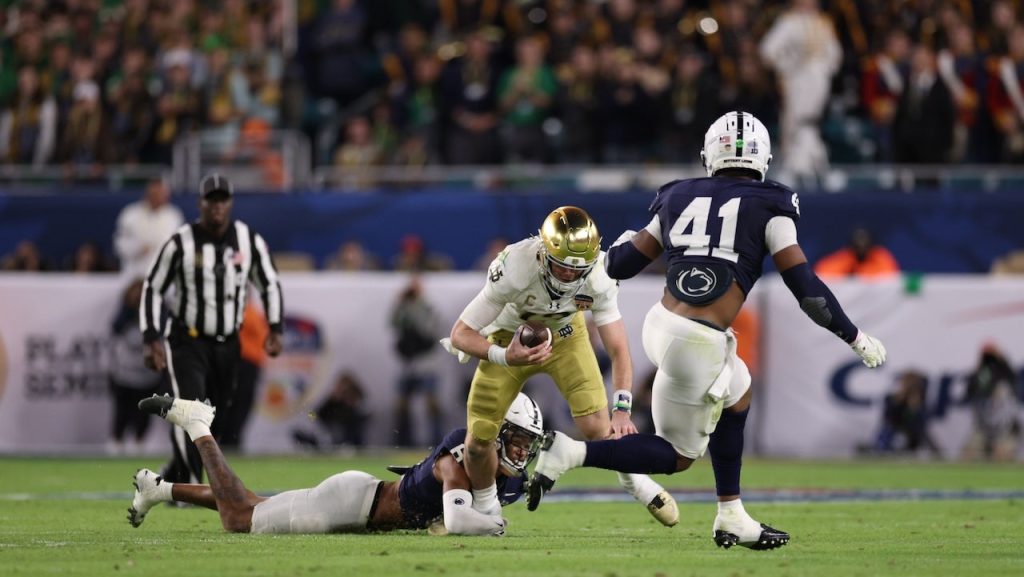The Notre Dame Fighting Irish found themselves in a precarious situation during the Orange Bowl, a College Football Playoff semifinal, when starting quarterback Riley Leonard was forced to exit the game late in the first half due to an injury. Leonard, a key component of Notre Dame’s offensive strategy, was hit by Penn State defenders Zane Durant and Dvon J-Thomas on a play, subsequently retreating to the medical tent on the sideline for evaluation. The nature and severity of Leonard’s injury remained unclear as the first half concluded, leaving the Fighting Irish with a 10-3 deficit and a significant question mark looming over their quarterback position.
The unexpected departure of Leonard thrust backup quarterback Steve Angeli into the spotlight, tasked with steering the Notre Dame offense against a formidable Penn State defense. Angeli, a native of Westfield, New Jersey, and a product of Bergen Catholic High School, possessed limited game experience at the collegiate level. His most notable performance prior to the Orange Bowl came in the 2023 Sun Bowl, where he led the Fighting Irish to a resounding 40-8 victory over Oregon State, throwing for 232 yards and three touchdowns. However, the pressure of a playoff semifinal, against a highly ranked opponent, presented an entirely different challenge for the young quarterback.
With Leonard sidelined, Angeli’s immediate responsibility was to manage the remaining seconds of the first half and minimize the damage. Notre Dame managed to salvage a field goal on the final play of the half, narrowing the gap to 10-3. While the score remained close, the loss of Leonard cast a shadow over Notre Dame’s prospects. Leonard’s pre-injury performance, completing six of 11 passes for 63 yards and an interception, highlighted the offensive challenges the team faced even with their starting quarterback at the helm.
The second half of the Orange Bowl would become a testament to Angeli’s ability to adapt and perform under pressure. The young quarterback, thrust into an unexpected leadership role, would need to draw upon his Sun Bowl experience and demonstrate the composure and decision-making necessary to navigate the high-stakes environment of a playoff game. The Fighting Irish, facing a talented Penn State squad, would need to rally around their backup quarterback and execute a cohesive game plan to overcome the deficit and keep their championship aspirations alive.
The Orange Bowl clash between Notre Dame and Penn State underscored the unpredictable nature of college football, where injuries can dramatically alter the course of a game and the trajectory of a season. For Notre Dame, the loss of Leonard represented a significant blow, forcing them to rely on a relatively inexperienced backup quarterback in a crucial playoff matchup. Angeli’s performance in the second half would determine not only the outcome of the game but also the narrative surrounding his own development as a collegiate quarterback.
The sudden shift in quarterback responsibilities brought to the forefront the concept of “next man up,” a common refrain in sports that emphasizes the importance of depth and preparedness. While Leonard’s injury undoubtedly presented a challenge for Notre Dame, it also provided an opportunity for Angeli to showcase his abilities and contribute to his team’s success. The outcome of the Orange Bowl would serve as a valuable learning experience for both Angeli and the entire Notre Dame program, highlighting the importance of resilience, adaptability, and the collective effort required to navigate adversity in the pursuit of a championship.

